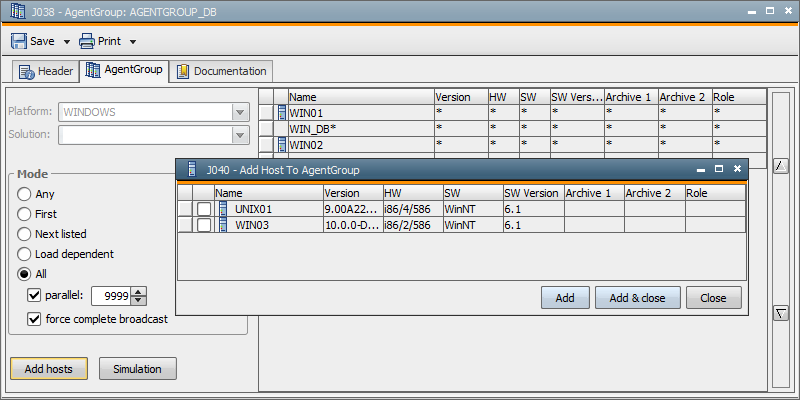
|
AgentGroup Attributes |

AgentGroup |
Agent/Client Assignment |

|
 Agent Groups
Agent GroupsIn order to be able to execute tasks on a computer, you require an agent. This agent initiates the start of tasks, monitors them during their execution and sends current status information to the Automation Engine. Agent groups combine agents in order to avoid that several objects are created when a task is processed on several hosts.
An agent group can only include agents of the same platform (such as UNIX).
An agent can also be assigned to several agent groups.
Examples of applications:
All of a client's agent groups are listed in the System Overview. The context menu provides several commands which can be used for all of the agent group's agents.
Assign agents to an agent group by selecting particular ones or defining filters for names or other attributes. Roles are useful for filtering attributes. The administrator can assign roles to each agent via the variable UC_EX_HOST_ROLE. These roles can then be used in agent group filters.
Examples of agent group definitions:
In agent groups, you can specify any agents and filter specifications of your choice.

Agent groups of system client 0000 can also be used in other clients. This requires that the administrator sets the relevant rights for the agent group. The client's agent group is used if the system client contains an agent group of the same name.
Note that an agent group of system client 0000 does not necessarily supply the same agent in each client. Agents obtain client authorizations after installation which can differ from each other.
An agent group does not only combine agents; it also controls the execution of tasks via a specified mode. On the one hand, agent groups execute tasks on all agents, and on the other hand, they realize workload distribution because they start tasks on particular agents.
The following modes are available:
The simulation function displays the agents which belong to an agent group and the agent on which the next task will run.
The Activity Window displays tasks that run only on one agent due to a specified agent group mode with a one-line entry. The column Host indicates which agent has been selected. An agent group container that obtains an entry for each task execution is displayed if the task runs in mode "All". This container contains the same name as the task and also shows an antenna symbol which is included in the object-type symbol. The type is "C_HOSTG".

The agent group container represents the superordinate task. Keep this in mind when you use script elements that retrieve parent values (e.g.: SYS_ACT_PARENT_NAME). The agent group container and the task have the same name but each one has its own RunID.
The Detail Window of the agent group's statistical record shows how tasks have ended. "0" signals that all tasks have ended successfully, "1" that some tasks were canceled and "2" that no task has ended successfully.
The Activity Window provides several commands for agent groups which can be called using the context menu. One of the available commands opens a monitor which displays tasks executions that took place because of the agent group.
The task changes to the status "Waiting for Host" if no agent could be retrieved at the time of task execution (such as all agents were inactive or the agent group filters did not supply results). The system regularly checks whether agents are available and active.
The administrator can specify this interval in the variable UC_SYSTEM_SETTINGS using the key AGENTGROUP_CHECK_INTERVAL.
Task start is initiated as soon as a host could be selected for the task. Workflows contain additional options allowing you to specify that those tasks that use the same agent group should run on the same agent. Without this option, there is the possibility that in particular modes or if agents become inactive or active, different agents are selected because tasks are started at different times.
Use the script function GET_ATT to retrieve the agent on which the task will run.
If a task is restarted, it runs on the agent group agent that has originally been selected.